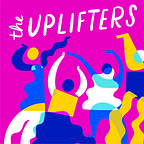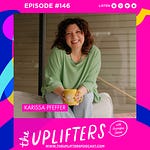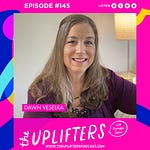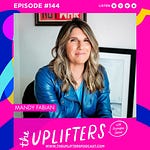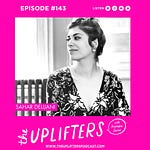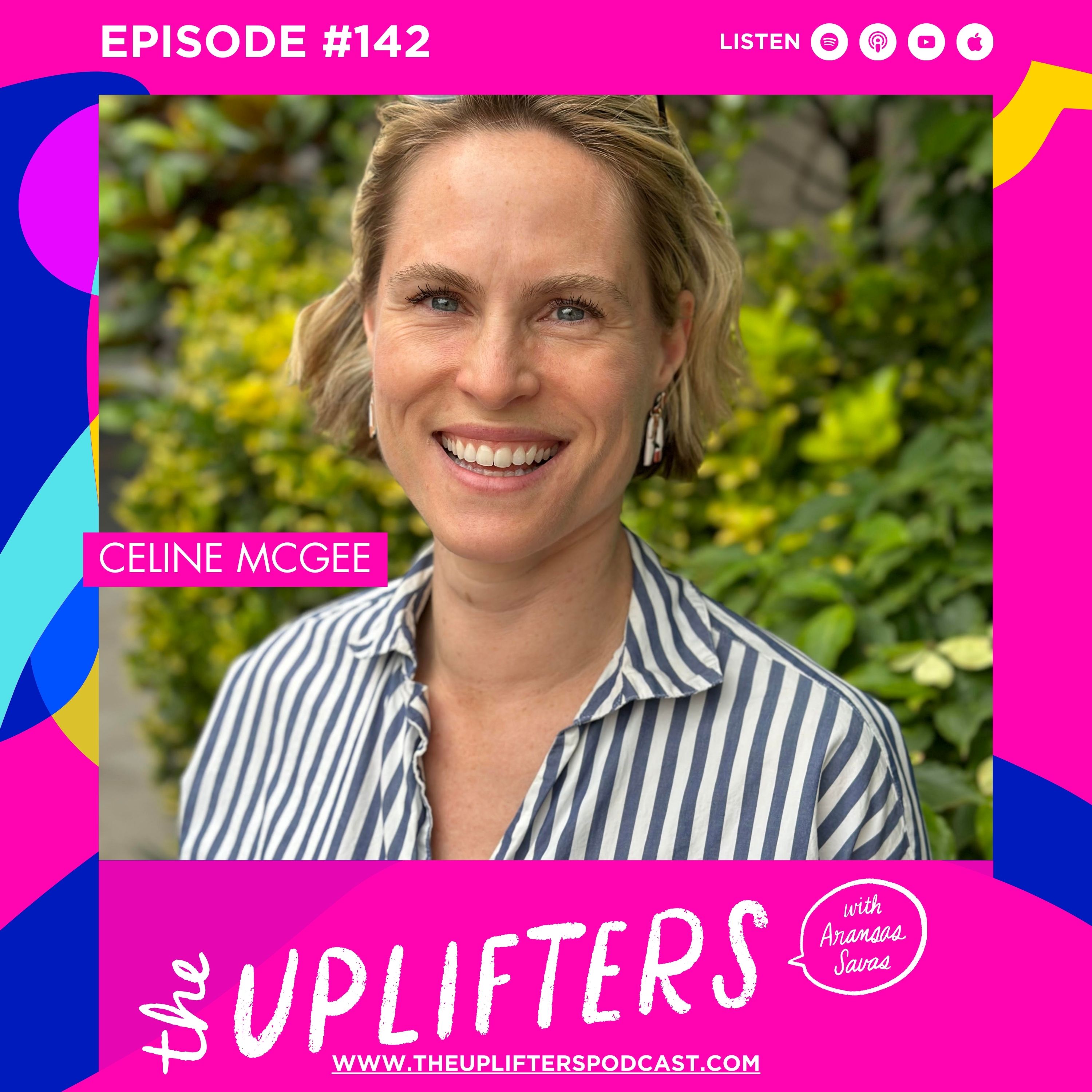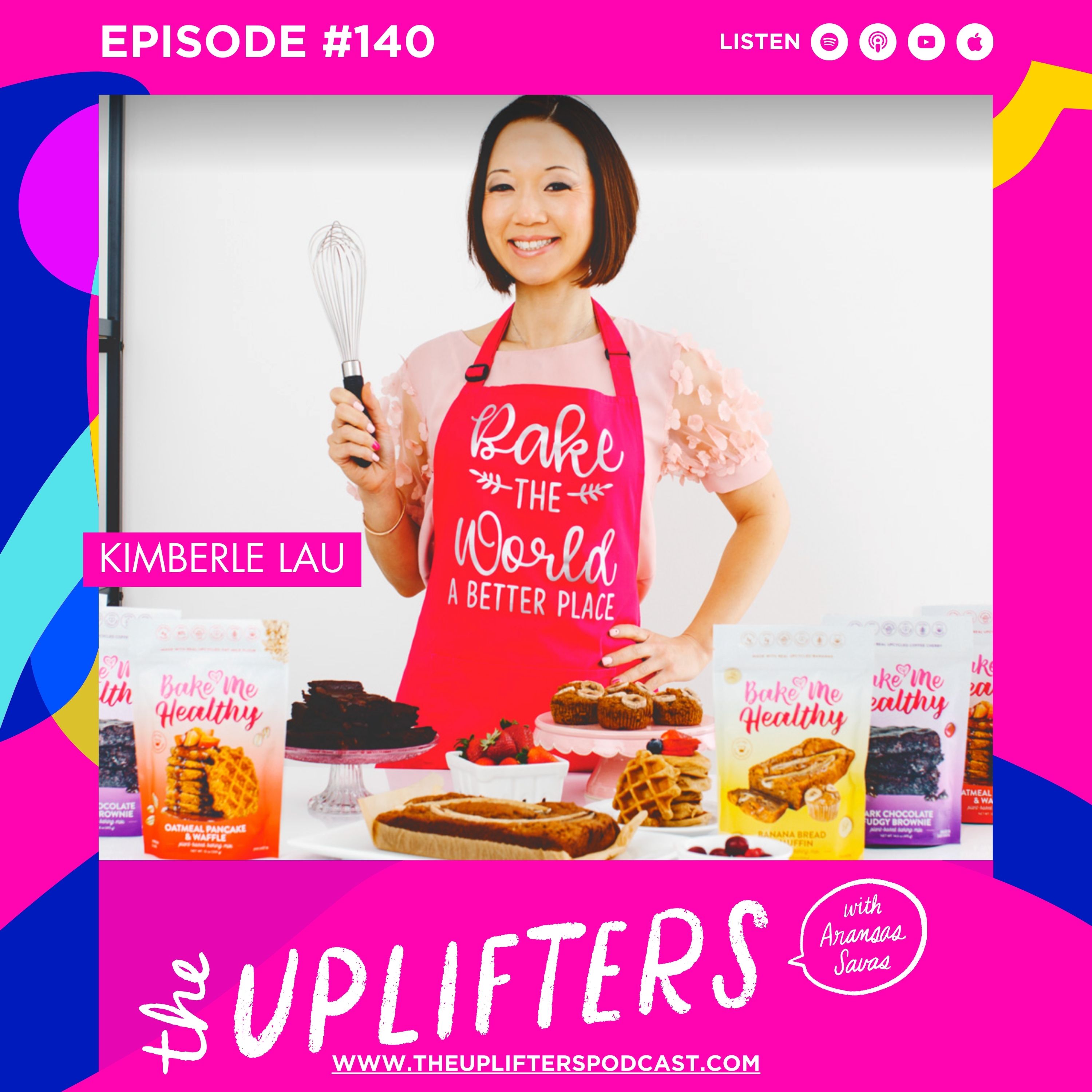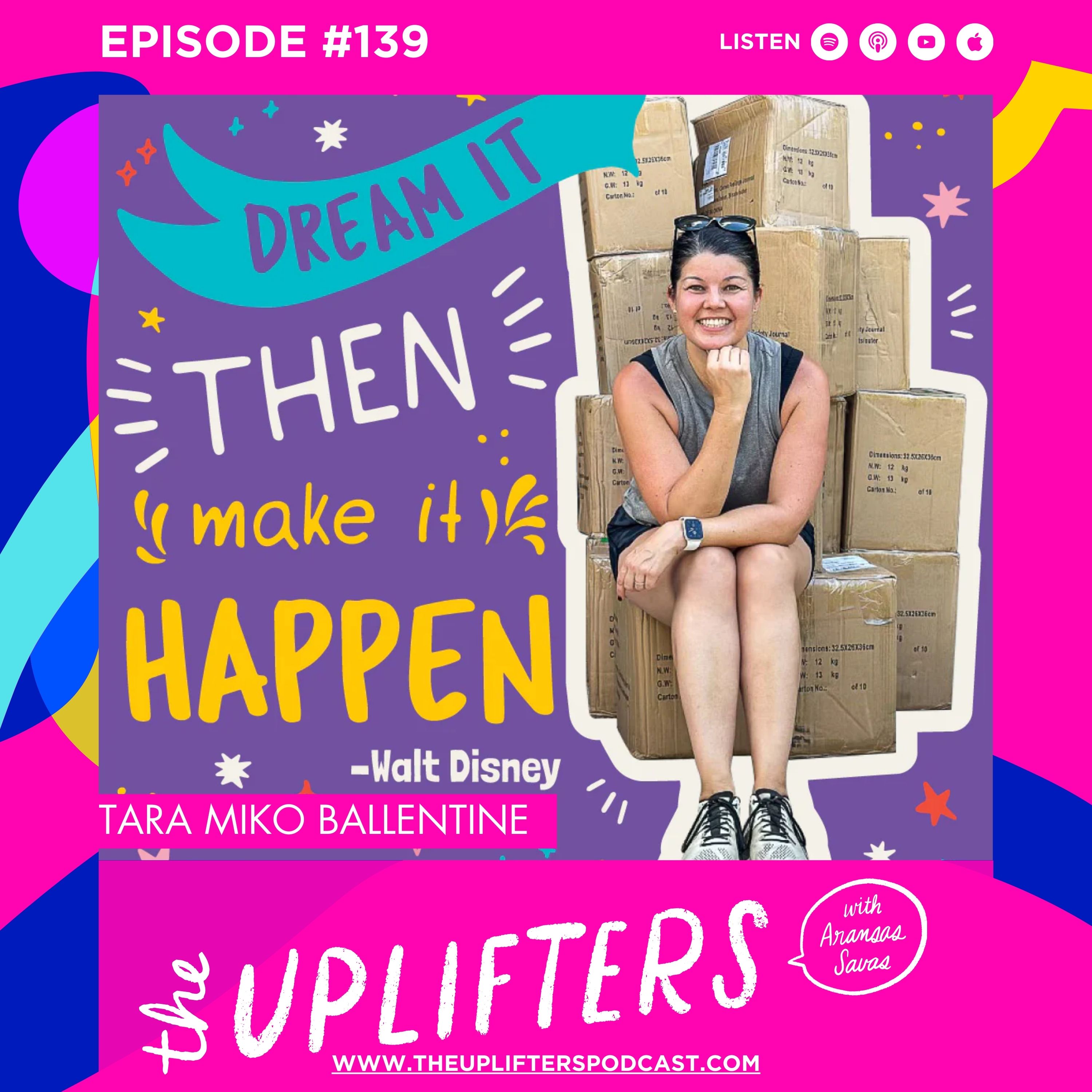Listen to our latest episode in the player here, on Apple Podcasts, Spotify, YouTube, or wherever you get your podcasts.
“I work really hard at not hiding my scars. I'm not gonna pretend I've got things all together. I've lived my life. I have my scars and they are part of whom I am. Jesus had scars.” Pastor Beth Carroll
This Week on The Uplifters
Less than 15% of lead pastors in America are women. Rev. Beth Carroll, Senior Pastor at Oakland City Church, is one of them.
Pastor Beth has lived through mental illness, a divorce, and an unexpected pregnancy at 22, for which she was kicked out of the church, excluded, and shamed when she most needed community and support.
Her personal experiences, the stories of those she cares for, and her belief that Jesus’ life is a story of radical inclusion, set her on a mission to create safe and brave spaces for those experiencing unwelcome or trauma in the church, especially those in the LGBTQIA+ community and others marginalized because of their mental health.
Instead of hiding her story, she’s used it to create trust. She teaches us that life's disappointments and traumas don't have to have the last word. The events that we thought signified our end or defeat can be the entry point into our life's calling. Every break-up, job loss, or insult forms and strengthens us, if we choose to process the pain.
“On the day I was kicked out of the church, I learned the power a pastor has to speak life or death into people. Now my favorite part of the job is to meet somebody, look them dead in the eye, and say, ‘You are good. God broke the mold with you. You are beautiful.’ To be able to use my mantle with the word reverend on it, and to be able to speak life into people.”
We may not all wear this mantle, but we all have the power to choose love, keep an eye out for the people in the back row, and offer a lifeline to those who are barely hanging on.
According to the Surgeon General, we are living in a loneliness epidemic. When we hide our scars, we hide from deep connections. Sure, there will be people who don’t get us. But, when we show our scars, we allow the people who were always looking for us, to really see us. And don’t we all want that more than anything?
Beth’s story is packed with powerful lessons. Here are a few that will always be with me:
How to cultivate the courage to stay strong when facing resistance (spoiler alert: It comes from within)
How to nurture spaces that inspire courage in others
How to “Preach from your scars, not your wounds”
Listen to the end for another bonus meditation, exploring these essential questions: What do I need for my body? What do I need for my heart? What do I need for my mind? What do I need for my spirit?
💓Huge thanks to Lisa Crozier from episode 13 for creating this incredible link in our ever-stronger Uplifter chain.
💓Find Beth on Facebook and Instagram: @elizabethgracecarroll. Her posts are witty, warm, thought-provoking, and hilarious!
💓Click for more from Nadia Bolz Weber, the source of the powerful quote, “Preach from your scars, not your wounds.”
Let’s keep rising higher, together,
Aransas
Messy Transcript
Welcome to the Uplifters podcast. I'm Aransas Savas. If you recognized that voice you just heard, recommending today's guest, it's because that was Lisa Crozier from episode 13 of the Uplifters podcast. And for those of you who've been with us for a while, you know that our show is in Uplifter chain. Here's what I know so far about Beth, so we're all at the same point in this. Beth is a Reverend who serves as Senior Pastor at Oakland City Church. She specializes in creating safe and brave spaces for those experiencing unwelcome or trauma in the church, especially those in the LGBTQIA community, and others marginalized because of their mental health.
Beth, thank you for taking time from your really important work to join us today on the Uplifters podcast. I'm so excited to meet you.
Beth Carroll (03:50.395)
I'm absolutely excited to be here.
Aransas Savas (03:40.285)
Thank you. I want to hear first when you knew you wanted to be a Reverend.
Beth Carroll (03:50.395)
Okay, so no one's more surprised that I took this path than me. This is a second career for me. So I grew up, when I was a little kid, I wanted to be an actor. That was my life's dream. And life circumstances ended up taking a completely different turn. I did study it in college, but ended up having a family instead. And so my life went into a different direction. I do, or excuse me, I did what a lot of
arts majors do is I went into sales. I was at a sales career for many years. Loved it, loved relationships, loved people. And becoming a pastor happened kind of in the second half of my life. My faith has always been really important to me. I grew up in the church. My
Parents were missionaries when I was a little kid. Both my grandfathers were pastors. It's the family business, but not for women. So it wasn't that I was discouraged. I didn't even, it just wasn't modeled for me to do something like that ever. But it got to be when my midlife crisis was kind of a deconstruction of my faith.
I was going through a divorce. It was under really challenging circumstances. My first husband really struggled with addiction and that had an incredible impact on our family. And in the process of
leaving and rebuilding my life. I really started taking the Bible seriously, my religion seriously and away from myself that I don't think I had to do before. The stakes were a lot higher for me in terms of my life. And I needed a lot of comfort. I needed community. And when I started reading the Bible for really for myself,
I saw a story, I saw a narrative themes where the life of Jesus was one of radical inclusion, was one of justice. And what I began to realize that the job of the church is one that should be about that work of justice and inclusion.
And at the time, in my context, I was seeing not only a church that was not about that work, it was the very obstacle to that work. And that infuriated me. God had just been too important to me. My relationship to God had been too caring, too incredible for an institution to get in the way of allowing other people to discover that too. So I knew I had to do one of two things.
I had to either quit the church or I had to dig deeper and do something about it. So I decided to do something about it. So at 35, I quit my job. Actually, I was let go of my job. That's a whole other story. But circumstances started to unfold themselves in such a way that it became very obvious that the next step was for me to go to school and to reinvent.
my life and my calling.
Aransas Savas (07:37.494)
Okay. No small feet there.
Beth Carroll (07:42.698)
Any one of those little threads could be a whole new story.
Aransas Savas (07:50.35)
Well, what did it mean to reinvent your calling? So I'm a singer, and for many years, I studied privately with different instructors. And when I was in my late 20s and early 30s, I was studying voice with a man named Nicholas.
Nicholas was a retired opera singer. He had moved to our small little community, which was this tiny little town in Holland, Michigan at the time. I don't live there anymore. And it was a very nice place, but it was a very traditional conservative place. And Nicholas was married to his wonderful spouse, David. And in the course of studying with Nicholas, not only was he a
Beth Carroll (09:03.955)
And on a weekly basis, Nicholas would share with me what it was like for him as a gay man living in our nice little town. And the stories that he told me about being denied housing because he was gay and the things that people would say and do to him in the name of religion, specifically in the name of Christianity were horrible. And because that was about the same time I was going through my divorce,
visiting other churches because it was time for a reset for me to go someplace else. And I would visit a church and then the next lesson, I would go in and Nicholas would ask me, Oh, where did you visit this week? And I would tell him, and then I would chatter on about, um, uh, you know, the sermon and the music and whatever. And then he would wait a beat. And then he would say to me, would I be welcome there? And I would have to like, Oh, no.
Nicholas would not be welcome there. And this pattern went on for several weeks. And that is really what started to make me grieve and be angry for what I was seeing before me, because that, once again, was not what I was reading in the Bible, it's not what I felt like was our call on.
people who identify as Christians to do. And I have a little bit of a bulldog streak in me. It's what my dad used to call me when I was little, where if something is not fair, I get angry. I'm not a very angry person in general. I realize I've mentioned anger several times already. And, but injustice and things that are not fair have been one of the biggest...
Aransas Savas (10:34.278)
And I have a book called Bulldogs, that my dad used to be talking to me when I was little, where if something is not fair, I get angry. I'm not a very angry person, in general. I've always mentioned anger, but injustice, and things that are not fair, have been one of the biggest things that have made me angry.
Beth Carroll (10:57.879)
Um, things that have made me angry ever since I was a little girl. Um, so seeing something that wasn't fair in this instance, I just couldn't live with that. It just was unacceptable.
Aransas Savas (11:09.214)
And so what did that fire up in you to do?
Beth Carroll (11:13.767)
This was the moment it was the moment that I started doing some soul searching. I mean, as a single parent, you know, I was the sole breadwinner for my for my kids. And I, you know, in my prayer life, oh my god, I don't I don't know how on earth this is going to happen. I cannot afford to quit my job and to go to seminary full time and support two kids. This is just ridiculous. I can't do that.
Meanwhile, I was in a job that I hated. It was a dead end job, but we were in the middle of a recession at the time. I couldn't quit. And so I'm holding intention, this need to provide for my kids and this need to do something that filled me and felt like was fulfilling my purpose. And I'll never forget, so I was in the process of investigating financial aid and...
wondering if I should just quit my job. And so talking to the admissions people at the seminary and talking to my pastor at the time. And I just actually had come to the conclusion that I can't do this. This is too much. My kids have been through too much. You know, I will revisit this when they're in high school. So at the time, my son was about 15 and my daughter was like 12. So I'm like, there's just no way I can do this now.
So I kid you not, not 24 hours after I'd made that decision. I get, I go to, it was a Sunday when I made that decision. I went into work on a Monday. HR called me into their office and I was let go. And it was like, are you kidding me right now? Like the job, the dead end job that I didn't think I could escape, that I hated.
Like the decision was taken out of my hands and I just knew like this is my time. So I am going to go to seminary. I, and I'm going to, we're going to make this work. I found a bartending job. I'd never bartended before, but it was like something that I could do like nights while I was in school during the day, you know, allowed me to still go to like my kids' basketball games. And so we made it work.
Aransas Savas (13:35.81)
That's amazing. I had a very similar situation in that I had been in a wonderful job with a wonderful company that I loved. And I knew I needed to graduate and leave the nest. And so I had set with all of my friends this very specific intention that I would leave my job on March 1st. And I didn't. So on March 3rd, I got laid off. Yes.
Beth Carroll (13:48.059)
Hmm.
Beth Carroll (14:01.809)
No way!
Aransas Savas (14:05.07)
I was like, all right, OK. Here you are, loud and clear, universe. Let's go. Yeah. And so you take this big leap and you lean into the possibilities. It was such an interesting shift in your storytelling there because you started off with, well, here's all the reasons this is an insane idea and all the reasons I clearly cannot do this right now.
Beth Carroll (14:10.58)
Totally.
Beth Carroll (14:18.435)
Mm-hmm.
Beth Carroll (14:23.676)
Mm-hmm.
Aransas Savas (14:35.022)
to, oh, well, clearly there are ways to address every single one of those challenges, and now is the time, so we're gonna do it.
Beth Carroll (14:35.088)
Right?
Beth Carroll (14:44.135)
Mm-hmm, definitely.
Aransas Savas (14:46.294)
And did you walk into Divinity School saying, hey, I believe the Bible is telling us a narrative of inclusion and justice, and I am here to spread that story.
Beth Carroll (15:02.663)
Absolutely. And the reality is the seminary that I went to, I would describe as being pretty moderate. In fact, a number of the professors that I have were very progressive thinkers. I had this one professor in particular who just invited me. He could see that like, oh, she's one of those. She's one of those, you know, kind of big mouth.
big idea, big hearted kind of people. And, and I'm so grateful. Like he, he was a theology professor, who taught a lot of progressive theologies, like liberation theology, queer theology, and just things like womanist theology, feminist theology, all the things, and I just ate it up. And had he not invited me to one of his classes, because
Typically speaking, there hasn't been a lot of women who go to seminary, first of all. Second of all, when they do go, they tend to like gravitate towards the pastoral care, kind of the counseling kind of track. They're not as attracted to the theology track. And so, and before that invitation, that had been me. I had been like, oh, I just love people and I wanna do things to listen and guide people.
Um, it wasn't represent, you know, there wasn't representation like in theology. So he invited me and I fell in love with, um, ethics and theology. And I just dug in and that ended up being my track. So very quickly I found my people. Um, and, and so it wasn't like this, I have to hold on to what I believe. And you know, these people are going to try to shake it out of me. It was like, um,
you know, I walked in with a spark and they threw in drops of gasoline. And so all of those passions ignited while I was at seminary. So, yeah, I was really blessed to be connected with the right people in the right circumstances.
Aransas Savas (17:16.046)
And what has the response been in the outside world now to this big mouth, big-eyed, big-hearted woman spreading a story of inclusion and justice?
Beth Carroll (17:29.123)
You know, good for the most part. So the first part of my pastoral career was in the Midwest. So in this tiny little town in Holland, Michigan, and I was a part of a church there that I would say was a fantastic match for all of those values. This is a church that had been open and affirming for probably close to 20 years. They were known in town as being kind of like the edgy, kind of more
progressive place. And, and so I never had to justify who I was what I believed like I was all of this. Yes, we love what you're talking about. And, and so that was this there was this wonderful nest, I think to kind of strengthen my leadership wings. Meanwhile, because of the amount of and I don't and I don't mean any disrespect for people who have more conservative leaning.
views. But there was also a number of church environments in this town where it was traumatizing and abusive towards specifically LGBTQIA people. And so you could throw a rock in any direction and find somebody who is LGBTQIA and deeply harmed by the church. And so to be able to meet people.
And I think my favorite part of the job was to meet somebody, look them dead in the eye, and say, you are good. God broke the mold with you. You are beautiful. You know, to be able to use my, you know, mantle with the word, you know, with the word reverend on it, and to be able to speak life into people.
I am a straight identifying woman, but I know what it's like. I've had some of my own past church traumas in my past. I've been kicked out of church. When I was 22 years old, I had an unexpected pregnancy. And the church that I was going to at the time.
I was terrified, I was alone. My boyfriend and I at the time went to the pastor because I so desperately needed support and care. And meanwhile, the pastor had heard why I was coming in, unbeknownst to me. I poured out my heart to this man, he listened. And when I got done, he leaned down and he picked up a stack of books and magazines on why premarital sex is wrong.
dropped it on the desk and shoved it at me. And then, you know, I was really involved in the church. I was singing the church, everything, and he's like, yeah, you need to take a break from all of those things, because we need to care for you. You know, it just was ridiculous. It was an utter lie. And so that has been deeply formational for me. Like I learned in that moment that the power
pastor has to either speak life or to speak death. And in that moment, he chose to speak death to me. And it took me years to process that and get over that. So though I don't know what it's like to be pushed out of the church, because somebody is gay or trans, I do know what it's like to be pushed out.
and the power that we have, especially those of us who have any sort of leadership capacity, to speak life into people. And I do that every chance I get to speak life.
Aransas Savas (21:31.278)
To me too, it sounds like the difference between acceptance and judgment. And the story I hear you telling is one of acceptance, a God loves everyone story, as opposed to God loves people who look and sound and live like me story.
Beth Carroll (21:51.099)
Absolutely. I mean, who wants to join, who wants to join a place that is not based in love? You know, why would we even do that to ourselves?
So I cannot undo the trauma of other people, but I at least can be, you know, like a rope that allows people to hang on, you know? So, yeah. So it's a big story. Like the people who have spoken death over us, the people who have spoken curses, they do not get the last word. They do not.
I will not allow that to happen for myself, and I'm gonna do whatever it takes to make sure that is the case for others too.
Aransas Savas (22:43.146)
What has that looked like in your work?
Beth Carroll (22:49.271)
That has looked like...
Beth Carroll (22:53.935)
You know what I said earlier in terms of meeting with people one on one and choosing to speak love when I know that people like me have not done that. It means that on any given Sunday at church, I'm in a different church now. I have a special affection and I for the back row peeps.
So the people who come in 15 minutes late and they kind of sneak in the back, I love those people. I know what it takes, how brave it is to come into a church for the first time, especially if you've either never gone to church or if church is a source of pain. It takes a lot to set foot in there. And I do not take that for granted for a minute.
Um, so I, um, sometimes I can be overly friendly to people, like to the point, like I got to watch it because sometimes people's eyes will get really big. Like when I see them after the service, I'm like, I'm so glad you're here. And they're like, thank you. You know, I'm like, you know, I'm not going to, I'm not going to stock you. I swear. Um, but, uh, but I just get, I just, it's a gift, you know, people who choose to show up and.
be a part of our lives, whether that's personally or whether that's in a church, whether that's in a nonprofit, anytime when somebody has a choice, like that's a gift. It really is that somebody chooses who doesn't know you yet to extend a little bit of trust. And I hope I never lose sight of that.
Aransas Savas (24:43.454)
And you said that in the beginning, you were in a bubble, a safe place where it was easy to be courageous. I assume from that answer that there was another chapter or other moments where perhaps it wasn't quite so easy to be as courageous or as inviting to be courageous.
Beth Carroll (25:12.483)
a good question. You know, actually, the first thing that comes to mind is I think the biggest obstacle for myself and being courage and having, excuse me, and having courage has been myself. It's been worrying about what other people think. I am a recovering people pleaser. So I will. Oh, well, how about that? And I don't think it'll ever be
Aransas Savas (25:35.682)
Same. What do you know? No, no, it's a work in progress.
Beth Carroll (25:45.172)
That's right, it is. And especially in my case, I'm also a recovering codependent. So having just all of the addiction in my family, so I grew up with a family member who struggled with addiction, you know, than my first husband. And codependents are funny people in that they...
gifts in co-dependence. Like if you're a co-dependent man, you see the best in everybody. Like you are committed, you are loyal to a fault. And so there's gifts in that. But what I've learned through my, I think both my co-dependency recovery and my people pleasing recovery is that there's a difference between something that's good and something that's better and something that's best.
And so maybe the good is being nice and kind to everybody you encounter. And that's a very good thing, but our energy is finite. And so I do think the best thing is being so centered in who you are, who you were created to be, what your focus is, who are the specific people you want to love in your life.
that you make sure that they get the best. And also being okay with the people who you're just simply not called to be with or the people who are damaging to you. They don't get your best. There's just not enough time and energy. Doesn't mean that you're rude or mean or cruel. It does mean that I'm okay with this person not liking me.
and letting that go. And again, that is a lifelong work. You know, I get sucked back into what people think. But anyway, to answer your original question, I actually think that it's me that I decide if I'm courageous and that if other people don't get to decide that for me.
Aransas Savas (27:38.03)
Mm-hmm.
Beth Carroll (28:01.631)
And sure, there have been environments, some environments have been easier than others, right? But yeah, I control what I can control.
Aransas Savas (28:02.041)
You...
Aransas Savas (28:12.782)
But when it feels like the stakes are lower, it feels easier to be courageous. It's not as big an ask.
Beth Carroll (28:17.695)
Oh, totally. Totally. Oh my gosh, you're so right. So right.
Aransas Savas (28:23.662)
So you talk about having a real passion and heart for creating safe and courageous spaces. What does that look like?
Beth Carroll (28:35.955)
It is a moving target because depending on the group of people that I'm trying to connect together, you know, each group has different needs. I just started a group at my at my current church. It's a it's a group called holding hope and it is a it's one part mental health support group.
Aransas Savas (28:37.934)
Mm-hmm.
Beth Carroll (29:03.743)
It's one part Bible study. And it's a place for both those of us who struggled with our mental health, because I am in that category as well. And for others who have struggled with their mental health to be able to say me too and listen and love well. Church has also been a complicated place for people who struggled with mental health. Lots of well-meaning people.
have used Bible verses in such a way that tell us not to be anxious, you know, and all of these kind of things that are so not appropriate and taking certain scripture and words out of context. And creating a safe and brave place for this group has meant, okay.
Where's your growing edge? Like what are the kind of things that people have said to you that have not been helpful? What are the kind of things that have been helpful? So first, you know, sharing my own story, I think is a way that helps up the trust level, the safe level, so that people like, okay, like our pastor, she's not perfect. She has her struggles.
If she can share, well, then maybe I can too. And so me creating the safety and being vulnerable gives permission for other people to do the same and be brave. It is huge. One of the biggest, the best pieces of advice that I've had in my work, there's a wonderful preacher called Nadia Bolz Weber, who I love, I've read several of her books.
Aransas Savas (30:37.215)
It's huge.
Beth Carroll (30:53.279)
And she has this kind of mantra, which is preach from your scars, not your wounds. And so I work really hard at not hiding my scars, that I've lived life. I'm not gonna pretend I've got things altogether or that I have altogether. I've lived my life. I have my scars and they are part of whom I are. Jesus had scars.
in his resurrected body when Jesus like rises from the dead and then comes back to earth to say, Hey, look, I rose from the dead. That's not a direct quote. He, he shows his disciples the nail scars in his hands. The scars are still there. They're part of who he is a part of his story.
And our scars are part of our story. So I will show you my scars and hope that you will feel braver and showing yours.
Aransas Savas (31:52.622)
Hmm, what do you believe happens when we try to hide our scars?
Beth Carroll (31:59.239)
I think we miss out. I think we deny ourselves.
Beth Carroll (32:08.727)
the ability, you know, the chances for connection. The Surgeon General recently talked about the epidemic of loneliness in our country. I think it's like one out of two Americans don't have a friend? Oh my gosh. First of all, let's raise our game and be a friend to people. And for those of us who are feeling lonely, man, take a leap, show somebody your scar.
Aransas Savas (32:12.492)
Yeah.
Beth Carroll (32:38.179)
Yeah, there are going to be people out there who don't treat it well. And that's awful. But there's also going to be people out there who see your scars as holy and beautiful and a sign of strength. And who doesn't want more of that in their life?
Aransas Savas (32:58.946)
Those are your people.
Beth Carroll (33:00.751)
Those are your people. Oh my gosh, yes.
Aransas Savas (33:03.666)
Yeah, I think when we hide our scars and our truths, we hide the opportunity, we hide from the opportunity for true love and acceptance.
Beth Carroll (33:15.815)
Absolutely.
Aransas Savas (33:20.262)
it because we can't even feel accepted if we haven't given our truth. And so then whatever is being responded to feels untrue because the stimuli we have handed as us and has been received, whatever response we're getting is to that, not to our truth. And so we always feel lonely and left out and alienated. And I think one of the...
Aransas Savas (33:48.598)
big things I take from your story is this idea that if you are in a place where your truth is not accepted, then go. You don't have to stay and fight. You don't have to convince anyone. You don't have to change. You just have to go find your place and your people. And that's its own work, but so worth it.
Beth Carroll (34:05.507)
Absolutely. Oh my goodness. So true.
So true. Like one of the churches that I went to before I was a pastor in my town of Holland, I went to a place for many years and it took me five years to make one friend there. Five years. I was like in my 20s and I think I thought there was something wrong with me. Like, why can't I, I'm a relatively outgoing person. Like, I like these people. Why doesn't anybody wanna be my friend?
And then I finally, like, you know what? Maybe I just need to try another church. And immediately upon changing churches, found my people. And it was a real like, oh, I need to pay attention to that. Like, it might not be that there's something wrong with me. It might be, I'm just in the wrong place.
You need to find your places where you're celebrated.
Aransas Savas (35:09.146)
Yeah. And I think the other really important message that I take from that is that all churches are not the same.
Beth Carroll (35:20.812)
Oh, they are not.
Aransas Savas (35:22.93)
just because they kind of come from the same source material, there are many different variations of that.
Beth Carroll (35:32.843)
Oh my gosh, so true. Yeah. America's amazing in that way. There are so many choices, so many choices. And it's a double-edged sword because on the one hand, you need to find a place where, yeah, like I said before, you're celebrated and you find your people and you hear a lot of me too, when you start to connect with people.
You know, you don't want to veer into this kind of consumerist idea where just because you don't like, you know, the bulletin cover or, you know, the song they sang that Sunday that you know, because I think that's the trick of community, right? Is it's a commitment. Like, I think so much in our country, we've made religion so much about me, like what I believe and there's beauty in that it's not that it's wrong. But we have to
Aransas Savas (36:09.483)
Mmm.
Aransas Savas (36:25.166)
Mm.
Beth Carroll (36:28.699)
balance that with community. Like what do I have to give here? Not just what do I have to receive, but where can I give? Like what, how can I make this place better? So it's those two things in balance.
Aransas Savas (36:42.754)
Think of it weirdly, like the way that we bought our house. We started, I know this is not expected, right? But we were like, well, we could focus on like, what's the color of the paint? And what is the exact floor plan? But ultimately we made a really excellent choice because we said, how do we wanna live within this house? What are the most important
values that this house needs to correspond with. And when we came at it from that direction, we actually, I mean, ended up buying a house that looked completely different than we ever would have expected, but it felt right. And it aligned well with how we wanted to grow and who we wanted to be in that house and the life we wanted to create from that place.
Beth Carroll (37:29.85)
I so love that.
I love that.
Beth Carroll (37:41.807)
Oh, that's a great foundation. I mean, that's a place that's something that empowers you to live the life that you wanna live, which is, yeah, again, like, that's what a church should be too.
Aransas Savas (37:45.858)
Yeah.
Aransas Savas (37:54.334)
I think the same is true with relationships, right? Like I could have picked my husband based on his height, his eye color, his hair color, the spelling of his name, but I was like, how do I feel in this relationship? And who am I with this person, right? And so I think when we come at the choice of where to invest our spiritual energy or where to find our spiritual community, I guess is the better way to say it.
Beth Carroll (38:08.48)
Oh yeah.
Aransas Savas (38:24.19)
It's all the same conversation, wherever we're building something that matters, to look at it through those same lenses of values and, as you said, the foundational elements.
Beth Carroll (38:29.563)
Mm-hmm.
Beth Carroll (38:37.52)
Absolutely.
Aransas Savas (38:39.861)
So...
Aransas Savas (38:46.301)
When I think of religion,.
Beth Carroll (38:56.091)
Hmm
Aransas Savas (38:56.202)
It feels like in a lot of ways it has become less central to our national culture. And I wonder for you as someone who has studied it deeply.
Aransas Savas (39:17.39)
What do you believe it needs to become in order to achieve great or to find a new space of relevance and value in our world?
Beth Carroll (39:32.902)
Mm-hmm.
Oh, I love this. I say, I get excited over things like this because I like to think about what's next. And yes, certainly institutional religion, not only in our country, but in Europe, numbers are shrinking. It is not the same in what's called the global South. So the rest other parts of the world, it's actually exploding, which is so fascinating to me. But...
But what I like to think about is, first of all, it doesn't belong to any of us. So it's gonna do what it's gonna do. But I think the next iteration, and so whether that's a smaller church, and that's okay, I don't think numbers really define. That's interesting information, but it's not necessarily the only information.
But I think it goes back down to what I mentioned before in terms of loneliness. That's one of the things we're working at in my current church is I'm currently in the Bay Area where there's a lot of transients, a lot of people who move here, a lot of people who move away. It was especially true during COVID and now with like the tech, all the tech layoffs. And so it's really affecting my region. And so one of the things we're talking about and getting creative about is, oh my gosh, well, if our-
institution, if our church is here to discover what the needs are in our community and meet those needs, the needs in our community are loneliness. What are we doing to solve the loneliness problem? So doing a lot of we're piloting a program like to have meals after church, so we can invite people to just share a meal, you know, becoming a culture of invitation and curiosity about other people.
inviting people to go on walks with us. Like what are we doing to check on our neighbor? And I think the more that we lean into discovering what the needs are around us and meeting those needs, the institution will take care of itself. It'll become something else, something beautiful, something that's needed and necessary. And I guess I'm still at the end of the day, an optimist.
And that I believe that is possible. I think, you know, just even as our country, like as divided as our country is, I believe that so much is still possible for us. But it takes a willingness to be curious about the people we interact with on a daily basis. It takes a willingness to put ourselves out there and to take a risk and love. Can you imagine what it would be like if we all did that?
Aransas Savas (42:28.418)
I want to sit with that image and surround myself with it. I want more of it, right? I want to feel loved and accepted. I want to feel deep, profound connection. As human beings, I think even
cynical and the most introverted person craves their flavor of connection. What is next for you, Beth?
on your evolution.
Beth Carroll (43:41.971)
Yeah, what is next is I have a new role. I am in a new place. I moved from Michigan to California. So nine months, excuse me, nine months ago.
Aransas Savas (43:51.338)
When was that?
Oh, this is new!
Beth Carroll (43:56.587)
Yeah, so yeah, and I have a new role. I'm a senior pastor. I'm both just honored and terrified by that, which is because only I think they wrote a statistic that was senior pastor roles, which is like that the lead pastor role in a church, only 15% of all of those roles are ever women. And so I'm like, Oh, my goodness, what a what a heavy mantle to carry. But my the next thing is
I'm learning all about this region. I'm learning about this beautiful church, which is incredibly diverse in every sense of the word with all of the beauties and challenges with that. So I'm getting to know these people. My husband's family is out here. So I'm getting to know his family, which is they're just incredible people on a more daily basis. So what a gift that is.
So yeah, I'm learning this new place and this new work and figuring out how can this Midwestern nice girl show up in the big city. So. Ha ha ha.
Aransas Savas (45:13.898)
as her true self.
Beth Carroll (45:16.183)
Absolutely.
Aransas Savas (45:17.918)
Yeah, yeah, so it's not how does this Midwestern nice girl fit into this place, but how does this Midwestern nice girl shine her Midwestern niceness in this place?
Beth Carroll (45:27.816)
Oh, oh, I love that. I love that. That's a good word.
Aransas Savas (45:32.987)
I love it for Oakland.
Beth Carroll (45:36.547)
Thank you, it's a really awesome city. Really awesome city.
Aransas Savas (45:38.954)
Yeah. I think when we go into those places that maybe have a different energy and vibe than we do, I like to think of us as balancing them in some way. Like in our little quadrant of this place, it's like, oh, I'm gonna bring a little of my balance. My sappy balance.
Beth Carroll (45:52.48)
Ooh.
Beth Carroll (46:02.151)
I love that. I'm gonna remember that.
Aransas Savas (46:05.87)
So, Beth, I like to end our episodes with a moment of reflection, big believer in the power of reflection and taking moments of quiet to sort of let ideas simmer for us. And I suspect you are a woman who asks powerful questions all day. What is one of the most
powerful questions that you ask the people you work with.
Beth Carroll (46:47.783)
Probably one of them is, what do you need right now?
What do you need right now, especially since a lot of times when I'm meeting with people, they're in a bad moment, they're in a struggling space. And then leaning into whether or not what they need is from me or helping them identify if what they need is from themselves. Or maybe it's a nap. Maybe it's something to eat, glass of water.
What do you need right now?
Aransas Savas (47:28.414)
And I suspect meeting one of those needs often awakens an understanding of other needs to be met.
Beth Carroll (47:37.211)
Definitely.
Aransas Savas (47:38.666)
It's like an onion. It peels away. Yeah, that hierarchy of need, right? When we say, okay, my thirst is met. Now I can tune into the fact that what I really need is to scream. And now I can tune into the need to cry. And now I can tune into the need to hug. So shall we take a moment together, Beth, and reflect on that for ourselves with the uplifters?
Beth Carroll (47:40.967)
Definitely.
Beth Carroll (47:49.136)
Hmm.
Beth Carroll (47:53.851)
Definitely.
Beth Carroll (48:07.271)
Absolutely.
Aransas Savas (48:08.298)
All right. I like to do this by grounding my feet. It helps me feel really connected to the sturdiness and the stability of the earth. And I bring one hand to my heart, one to my gut, and close my eyes. And let's just spend these next couple of moments quietly asking ourselves.
what it is we really need.
Aransas Savas (48:47.566)
And maybe as you get curious, you begin to ask yourself, what do I need for my body?
Aransas Savas (48:58.166)
What do I need for my heart?
Aransas Savas (49:08.994)
What do I need for my mind?
Aransas Savas (49:18.962)
And what do I need for my spirit?
Aransas Savas (49:38.866)
and breathe that in.
Aransas Savas (49:43.838)
And as you are ready, perhaps you want to get curious about what or whom could meet those needs and what tiny step you might take today or even in this very moment towards meeting your needs.
Aransas Savas (50:09.638)
Ah.
Beth, I am so grateful to have met you and to have heard your story. Thank you for being here. Thank you for all that you do.
Beth Carroll (50:22.151)
Thank you, Aransas. I appreciate that, thank you, thank you.
Aransas Savas (50:27.266)
For all of you listening, thank you for all that you do in the world. You uplifters, you make this world and your little corner of it better and safer. And may we all tap into a little of this big mouth, big idea, big hearted Beth wisdom here and allow ourselves to courageously challenge that which is unfair.
and to advocate for greater acceptance, more love, and more connection.
I'll see you over at theuplifterspodcast.com where you'll hear lots more from Beth and Lisa and lots of other uplifters, as well as bi-weekly, tri-weekly, three times a week, I don't know, as well as newsletters from me three times a week with lots more uplifting news and stories and ideas from out in the world.


